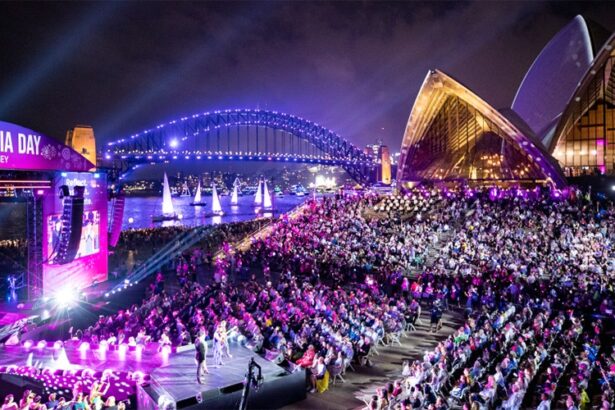Australian Day concert and water, featuring live musical performances from top Aussie acts and dazzling fireworks
Australia Day is an important event celebrated annually on January 26. It marks the day when the First Fleet of British ships landed in Port Jackson, New South Wales, in 1788. This landing, led by Captain Arthur Phillip, is often considered the beginning of European settlement in Australia. While many Australians view the day as a celebration of their country’s history, culture, and achievements, it also has complex meanings for different groups of people, particularly for Indigenous Australians. In this article, we will explore the history of Australia Day, its significance, and the reasons behind the celebrations.
The History of Australia Day
The history of Australia Day dates back to the early days of European settlement. On January 26, 1788, Captain Arthur Phillip and his fleet of ships arrived in what is now Sydney Cove, marking the start of the British colonization of Australia. This event is regarded as the birth of modern Australia. Over the years, Australia Day has evolved from a simple commemoration of the First Fleet’s arrival to a broader celebration of Australian identity and culture.
Initially, the day was celebrated as “Foundation Day” in New South Wales, with some colonies marking it in different ways. In the 19th century, the day began to be observed across Australia, but it wasn’t until 1935 that all states and territories officially recognized January 26 as Australia Day. It was declared a national holiday in 1994.
For many, Australia Day is a time to reflect on the history of the country and acknowledge the contributions that immigrants, Indigenous people, and all Australians have made to shaping the nation. However, it’s important to understand that the date also has a different meaning for the Indigenous communities of Australia.
World-renowned Sydney Opera House sails will be illuminated with a spectacular Aboriginal artwork
The Significance of Australia Day
For many Australians, Australia Day is a day of national pride. It’s a time to celebrate the country’s achievements, diversity, and the shared values that bring Australians together. Across the country, people come together for community events, festivals, barbecues, concerts, and public ceremonies. In major cities, a variety of events such as the Australia Day Parade and the spectacular Australia Day Live concert showcase the nation’s culture, art, and history.
The day is also marked by the announcement of the Australian of the Year Awards. These prestigious awards honor individuals who have made significant contributions to the country in fields such as science, sports, education, and the arts. The winner is celebrated as an inspiring role model for the nation.
Celebrating Australia Day
On Australia Day, there are many different ways to celebrate, and the events vary depending on where you are in the country. Many people enjoy outdoor activities such as beach barbecues, fireworks displays, and community picnics. Sporting events like cricket and tennis matches are often held, and public festivals are common in larger cities. The day is also a great time for families and friends to spend quality time together.
In Sydney, one of the highlights of the celebration is the Australia Day Parade, which showcases a diverse range of cultures, traditions, and people that make up the Australian community. Additionally, Australia Day Live is a concert held in the evening, featuring performances by famous Australian musicians and artists. This event is broadcast to millions of Australians and represents the joy, unity, and spirit of the nation.
Ferrython is back for Australia Day tradition and is one of the most popular events on Sydney Harbour
While Australia Day is celebrated by many, it is also a day of mourning and reflection for Indigenous Australians. For these communities, January 26 marks the beginning of British colonization, which led to the dispossession of their land, the loss of cultural traditions, and the widespread impact of European settlement on their way of life. As a result, some Indigenous Australians and their supporters refer to the day as “Invasion Day” or “Survival Day,” highlighting the negative consequences of colonization.
Many Indigenous groups have called for a change in the date of Australia Day to better reflect the history and cultural significance of the day for all Australians. These voices encourage a more inclusive and respectful approach to the celebration of Australian history. Discussions around Australia Day are an important part of the ongoing conversation about reconciliation, respect, and recognition of Indigenous peoples’ rights and history.
WugulOra (meaning ‘One Mob’) is a time for inclusion, understanding and reconciliation
Australia Day is a complex and multi-faceted occasion. It’s a day of celebration for some and a day of reflection for others. While it serves as a reminder of Australia’s beginnings, it also highlights the need for ongoing discussions about the country’s past, present, and future. Understanding the different perspectives surrounding Australia Day is key to fostering a more inclusive and respectful national conversation.
By learning about the history and significance of Australia Day, we can better appreciate why the day is meaningful for so many, while also being mindful of the impact it has on Indigenous Australians. Whether it’s a time for celebration or a moment of reflection, Australia Day provides an opportunity for all Australians to come together, share stories, and look towards a more united future.
The post Happy Australia Day! appeared first on Newswire.





